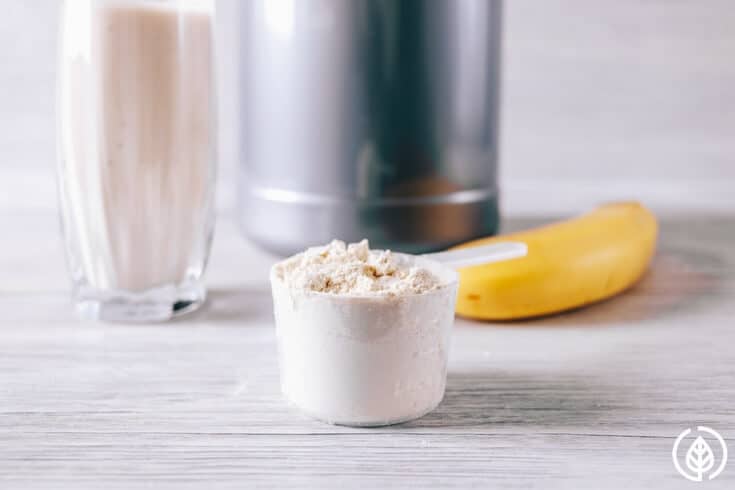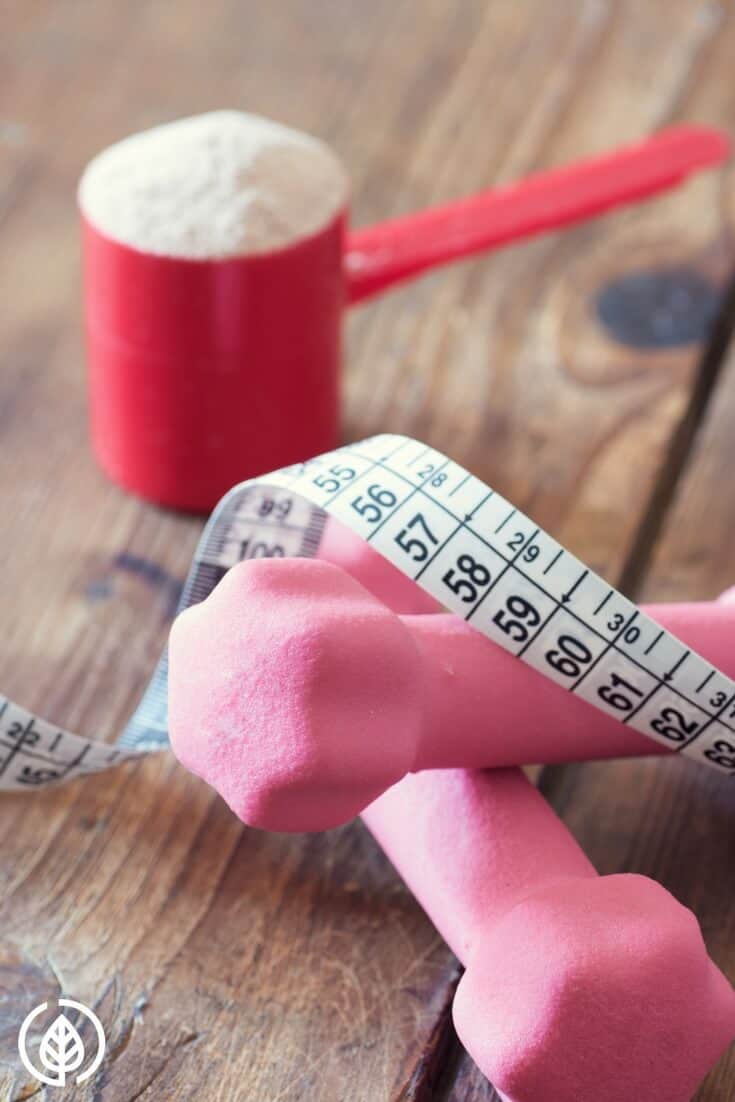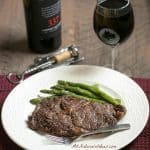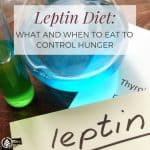Does supplementing with protein powder help lose weight? Or is it just for bodybuilding hulks? And if it does help, what’s the best protein powder for weight loss?
Protein powder is one health fad that seems like it will never go out of style. Although originally the domain of bodybuilders and strength athletes, it’s now a mainstream supplement.
In fact, protein powders sales are roughly $5 billion per year. That’s in the U.S. alone. That makes protein powder a huge slice–70 percent—of the $6.7 total sports nutrition pie. [SOURCE]
But for the masses who don’t want to get, well, massive, at least in the muscular sense, are their benefits to supplementing with protein powder? And more specifically, in the battle of the bulge that afflicts the majority of American adults, does taking protein powder to lose weight really work?
And if it does help you lose weight, the question then becomes this….
What is the best protein powder for weight loss? After all, there’s several different sources of protein powder. There’s egg protein. And beef. There’s even vegan sources now such as rice, pea, hemp as soy. And who can forget whey protein, which is the top-selling type of protein powder.
Yet another problem to address in selecting a protein powder for weight loss is quality. According to a ConsumerLab.com report (last update: February 10, 2018), nearly 30% of the protein products in their test doesn’t pass their testing protocol.
And brands of protein powder that are approved by Consumer Lab range greatly in price. A serving of protein powder runs anywhere from 67 cents per scoop all the way up to $5.
Protein powder for weight loss: what type of powder?
Before answering the question if protein powder for weight loss works, here’s another factor to consider….
In addition to the different kinds of protein powder like whey and hemp, for example, there’s different processing methods. There’s protein isolate. Isolate removes the fat and carbs.
The next type of processing is concentrate. Concentrate powders contain both the fats and carbs. They also contain compounds that may boost immunity. However, some newer generation of isolates also have the beneficial compounds.
Hydrolysate is yet another processing method. In a nutshell, this protein is very easy to digest. That’s because the protein is broken down. This method is ideal for consuming immediately after a workout because it gets absorbed quicker. However, for the average person who isn’t doing intense exercise, it may not be the best protein powder for weight loss.
Finally, the fourth major processing method of protein powder is ion-exchange. This method offers the most purity of the protein powders. The one disadvantage of ion-exchange is it does not contain the immune-system supporting compounds.

Whey protein powder for weight loss and lean muscle
The bottom line about protein powder for weight loss is this….
If you supplement with protein powder and do some resistance training, research suggests you’ll lose weight. Likewise, if you are obese and supplement with protein powder, you may also lose weight. However, it’s not clear that protein powder for weight loss works if you don’t exercise much.
According to a study in the American Journal of Clinical Nutrition (AJCN), protein powder encourages lean muscle gain. The study concludes protein supplementation increases muscle mass and strength gains. But it does this only during relatively longer resistance-type exercise training. If you do some resistance training, the good news the muscle gain applies to both younger and older subjects.
Unfortunately, you can’t conclude from this study that protein powder for weight loss works. That’s because this study says that if you’re trying to lose weight, yes, your muscle mass will be greater. You’ll even get stronger. However, you won’t get leaner. This suggests that it’s possible to gain muscle and still have just as much fat.
However, another study (also in AJCN) does offer hope for protein powder for weight loss. Albeit with a couple strings attached. The study concludes protein powder may help you lose fat while gaining muscle. But the study only involves obese young men. Moreover, the subjects consumed 40% fewer calories for a month.
Also, during the one month, they did intense exercise. And not for just a few days a week. Try six days a week! At the conclusion of the study, the experimental group lost more fat. On average, almost three pounds. They also gained almost 2.5 pounds of muscle on average.
Protein powder for weight loss: does exercise matter?
The takeaway from this study is this. Although whey protein powder may help you lose weight, eating less calories than you normally do is also critical for weight management. Getting regular exercise, too, is vital for weight loss.
Still, researchers were intrigued by the results. In part because the high-protein experiment group lost more body fat. A ScienceDaily.com article on the study quotes a researcher,
“We expected the muscle retention [from exercise] but were a little surprised by the amount of additional fat loss in the higher protein consuming group.”
More statistics from the study are impressive. The high-protein group lost on average 10.5 pounds. However, the controlled conditions of the study were quite rigid. And not everyone has the discipline to stick to a gruelling exercise and diet program.
Which brings us back to the question if protein powder for weight loss works … if you don’t regularly do pushups and squats?
The answer: maybe. Especially if you have diabetes (says this study). Or at the very least, it can help normalize blood sugar. And this study suggests taking a protein supplement twice a day along with reducing calories by 500 per day is effective for weight loss.
In the latter of the two studies above, the subjects taking the protein powder lose more body fat. This, in comparison to the test group who drank a different beverage. On average, the test subjects lost over six percent of their body fat mass. And the good news is the experiment group didn’t have to do any hard-core exercise.
Also, if you are going to need bariatric surgery, protein powder for weight loss is ideal, according to this study. Especially for keeping the weight off.

Best protein powder for weight loss and meal replacement
Research by Consumer Labs warns that some brands of protein powders have at least one problem. First, the actual ingredients may not contain all or as much as what the nutrition label claims. Second, some brands contain harmful substances such as lead. Arsenic, a toxic heavy metal, is in some rice protein powders, according to FDA testing. And the third problem with some protein powders is poor manufacturing processes. (Read this for a scholarly article on quality concerns in protein supplements.) And yet another problem with certain protein powders is they contain excess sugar.
Specific brands that fail ConsumerLab testing include Jay Robb Egg White Protein. That’s because it claims to be free of cholesterol. But it actually contains 16.5 mg of it per scoop. ON Gold Standard 100% Whey Double Rich Chocolate also contains false claims about cholesterol content.
And if you’re vegan, avoid Hammer Nutrition’s vegan chocolate. It contains cadmium, which, like arsenic, is a toxic heavy metal. Consumer Lab suggests the cadmium is most likely from cocoa powder. Cocoa powder contains unusually high concentrations of cadmium, says the research organization’s report, which is available with a subscription. (Love cocoa powder? Instead, use cacao powder, which is better for your health; yes, there’s a big difference between ‘cocoa’ and ‘cacao’.)
A couple vegan-safe options are Nature’s Way Alive Ultra Pea Protein Shake and Nutiva Organic Hemp Protein Powder. In addition, another safe vegan-friendly plant protein is PlantFusion Complete Plant Protein – Vanilla Bean. It combines the interesting combination of pea and artichoke protein.
The best protein powder for weight loss (and health): grass fed whey
If you’re not vegan and lactose-intolerant, perhaps the best protein powder for weight loss and overall health is grass-fed whey protein. The reasons why include the fact that grass-fed whey offers an ideal ratio of omega 6 to omega 3 fatty acids.
Also, grass-fed whey contains a high amount of beta carotene. Some of the beta carotene converts into vitamin A. There’s also more CLA, a healthy type of fat that can help burn more fat. In addition, grass-fed contains higher amounts of glutathione. This is your body’s natural antioxidant that protects you from disease.
Testing by Consumer Labs reveals that Reserveage Grass-Fed Whey Protein meets testing standards. However, perhaps even better than grass fed whey is raw grass fed whey.
Raw means that there’s no pasteurization. Without pasteurization, beneficial bacteria survive. And when you consume raw grass-fed whey, you’re getting all the above benefits. Plus, you’re also consuming a great source of probiotics. Unfortunately, raw grass fed whey protein powder is harder to find because of FDA regulations.
How to use protein powder for weight loss
According to recommendations by the American Dietetic Association (ADA), if you don’t get much exercise, you only need about 0.4 grams per pound of body weight. If you are active bump that amount to 0.55 to 0.80 grams of protein per pound.
This range depends on what type of exercise. The lower range is for walking and light cardio. The higher range is for resistance training. Using the example of a 150 pound sedentary person, this formula equates to 60 grams of protein. For active types, it’s 90-109 grams. The maximum amount of protein the ADA recommends is 1 gram per pound of protein.
Keep in mind there are potential side effects of taking too much protein powder for weight loss, such as hair loss, and kidney stress. But for most people, consuming 1-2 scoops of protein powder is safe.
Make sure you don’t add lots of fruit or sweetener to a smoothie. That can negate any benefits of protein powder for weight loss.






